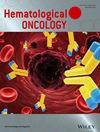Exploratory Analysis of Practical Predictive Indices for the Efficacy of Mogamulizumab in Patients With Aggressive Adult T-Cell Leukemia-Lymphoma
Abstract
An exploratory analysis of past clinical trials was conducted to propose a predictive scoring system for the efficacy of mogamulizumab, an anti-CC chemokine receptor 4 (CCR4) antibody, based on easily measurable parameters. Factors affecting progression-free survival (PFS) were investigated using data from three clinical trials (NCT00920790, NCT01626664, and NCT01173887) and one clinical study (UMIN000013294) conducted in patients with relapsed/refractory (R/R) or untreated CCR4-positive aggressive adult T-cell leukemia-lymphoma (ATL) receiving mogamulizumab treatment. Twelve routinely measured clinical parameters and three calculated indices—lymphocyte-to-neutrophil count ratio, platelet-to-lymphocyte count ratio, and lymphocyte-to-monocyte count ratio (LMR)—were selected as variables. Univariate Cox proportional hazards analysis identified albumin level, disease type, lactate dehydrogenase (LDH), monocyte count, neutrophil count, and LMR as relevant factors in R/R ATL patients treated with mogamulizumab monotherapy (p < 0.05). A predictive model constructed from multivariate analysis results stratified the monotherapy group (n = 69) into three subgroups, with scores of 0 (n = 5), 1 (n = 25), and 2 (n = 39), based on LDH (0 for < 265 and 1 for ≥ 265) and LMR (0 for ≥ 3.571 and 1 for < 3.571). Median PFS values were 0.57, 0.46, and 0.07 years for scores 0, 1, and 2, respectively (log-rank test: p = 0.005 for score 0 vs. 2; p < 0.001 for score 1 vs. 2). The simple model combining LDH and LMR may predict PFS in patients with R/R aggressive ATL receiving mogamulizumab treatment. Since LDH and LMR are easily measurable in clinical practice, this model could help predict mogamulizumab efficacy and guide treatment decisions in this patient population.
Trial Registration: Registration number: UMIN000049135. Date of registration: October 17, 2022


 求助内容:
求助内容: 应助结果提醒方式:
应助结果提醒方式:


